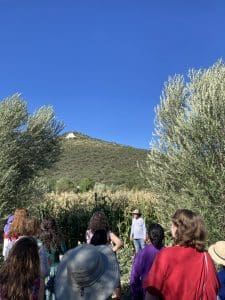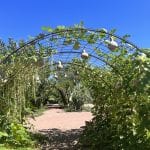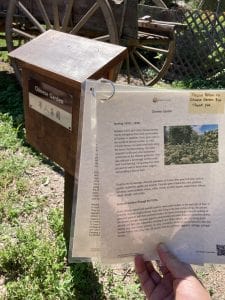Learn about Mission Garden!
According to their website, "the Garden is a living agricultural museum of Sonoran Desert-adapted heritage fruit trees, traditional local heirloom crops and edible native plants. The Garden is managed by Friends of Tucson's Birthplace, a 501(c)3 nonprofit. It is located at the foot of Sentinel Peak, at the site of the Native American village of S-cuk Son (pronounced Chuk Shon), a place sacred to the Tohono O'odham.
This blog post was written by Paige C., a member of the Biblio Lotus Team.
The morning is cool, but the heat of the day is encroaching, as bold as the mosquitos at the entrance. Sentinel Peak looms over Mission Garden, which resides at the site of S-cuk Son—a location sacred to the Tohono O’odham and a place with more than 4,100 documented years of agriculture. From this place of food borne wealth, our city of Tucson vined outwards and into what it is today.
On this Thursday, a small group of people from the Seed Library Team and Biblio Lotus Team (a group of staff supporting Asian Communities) met in the shade of the awning at Mission Garden to take a tour of these millennia of agricultural history.
Jerome, a representative from Mission Garden, led the tour to teach those in attendance about Tucson’s rich agricultural history and the evolution of food in the Southwest. Visitors are offered samples from the plants—treats such as white pomegranate, quince, and jujubes. As these delights are tasted by many guests for the first time, the ancestors of familiar foods from corn to squash grow serenely against the bright blue background of the desert skies.
Among these tasty treasures are special boxes that appear at varying locations throughout the garden, creating their own path. These are markers for the Bookworm path, each spot marking a new activity designed for teaching grades K-12 about the desert agriculture surrounding its area. This is a path that can be used whenever the garden is open, which is Wednesday through Saturday from 8 am to noon April-September and 8 am to 2 pm October-March. Entry to Mission Garden is free with a suggested $5 donation.
The Seed Library and Biblo Lotus Teams came to Mission Garden with the goal of collaborating on bringing attention to one important piece of Tucson history that should never be forgotten: the Chinese immigrants who came here at first in 1860, and then in increased in numbers in the 1880s with the railway construction.
As they settled in Tucson, many Chinese immigrants created their own gardens and sold fresh vegetables to those also inhabiting the Southwest. The food they would grow to sell were those vegetables that appealed to the European palate, while for their own selves they grew traditional Chinese vegetables that may not sell to their main clientele. These Chinese grocers fed Tucson until the rise of chain grocery stores forced them out.
Between Mission Garden’s dedicated Youth Garden and Mexican Garden this history is illustrated with the Chinese Garden. Here luffa, bitter melon, and more grow within wooden garden boxes. Through working with Mission Garden, the seeds of these plants that are as crucial to our history as pomegranate and maize will be added to our library’s seed collection. Recipes and further information about these plants are planned to be added to the Pima County Library’s offerings to Pima County communities and residents, and the great contributions of Chinese immigrants to Tucson’s today will be highlighted and emphasized.
To stay up to date all things Mission Garden, we recommend following them on Instagram and signing up for their enewsletter!






